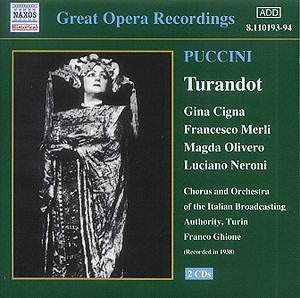This was the first complete recording of "Turandot",
recorded in 1938 by Cetra (a company founded to promote Italian music
and musicians). Everyone involved in the recording was used to radio and
studio recording and the cast was one of the best available.
The Turandot, Gina Cigna (1900 - 2001) was a French
soprano who studied with Emma Calvé and made her debut at La
Scala in 1927 as Freia in "Das Rheingold". She went on to become the
leading spinto soprano in Italy, singing also at the Met and at Covent
Garden. She sang the title role in "Turandot" around some 500 times.
Her main rival in the role was Eva Turner. The year before this studio
recording was made, live recordings were made at Covent Garden performances
of "Turandot" with Eva Turner and Giuseppe Martinelli conducted by John
Barbirolli. Only excerpts were recorded, but we do have the complete
riddle scene which can make an interesting comparison with the present
record.
Cigna's Princess Turandot is no ice-cold maiden. Her
vocal quality (her voice has a rather quick vibrato) combined with her
passionate delivery make Turandot into an angry, all too flesh and blood
figure. I suspect this is partly Cigna making the most of her assets.
Reading reviews of her other performances you gather that she rather
divided critics and tended to powerful, elemental performances without
worrying too much about stylistic niceties. One can see Cigna's type
of Turandot developing into some of the more modern recordings where
soprano's opt to make the Princess obviously flesh and blood, the ice
dissolving well before the Puccini/Alfano climax.
Eva Turner on the other hand had few limitations in
vocal power. She capitalises on the power and focus of her voice, giving
us the definitive truly icy Princess and in the live excerpts from Covent
Garden she is truly thrilling.
Magda Olivero's Liù is rather more warmer voiced
that I expected, though the soprano was famous for her Tosca and Adriana.
She can slim her tone down admirably, and makes quite an affecting Liù.
In her death scene she shows a welcome element of steel in her fragile
vocal line.
The Calaf, Francesco Merli, was one of the principal
tenors at La Scala in the inter-war years. He has a rather robust voice,
giving one cause for pleasant surprise at the quality of the higher
lying passages. Quite an elegant performer, he turns in a well shaped
performance of 'Nessun dorma'. Less visceral, perhaps, than Martinelli
on the live Covent Garden recording, but with a better sense of control
and line. It is interesting to compare Merli's performance with Pertile's
1927 recording which is included in the appendix. Both have a similar
somewhat elegant quality, but Pertile's performance is marred by suspicious
tuning.
The Timur, Luciano Neroni, is described as one of the
leading basses of his generation. The recording just does not always
do justice to his rather dark voice, but he makes a noble contribution
at Liù's death in Act III. It is also difficult to judge Armando
Giannotti as Altoum. Much of his contribution sounds as if it was recorded
in another room, still he is effective enough in his small roles. Giuseppe
Bravura, alas, does not make the requisite impact in his short, but
important, solos as the Mandarin.
Franco Ghione was not one of the great Italian conductors.
But he is a safe pair of hands, especially in the fraught atmosphere
of studio recordings of such large forces. Perhaps the climaxes lack
visceral excitement, but they are admirably coherent compared to some
early recordings. On first hearing, the recording seems to be barely
able to contain the large forces in the major ensembles. But on repeated
listening, I was amazed at how much detail is audible.
The second CD is filled up with a series of fascinating
archive recordings. These include 'Signore ascolta' sung by the original
Liù, Pertile in two of Calaf's solos, excerpts from Act II sung
by three members of the original cast, two live fragments from La Scala
and Eva Turner's 1928 studio recording of 'In questa reggia". These
provide a fascinating insight into the performance of "Turandot" in
Italy between the wars.
Robert Hugill



